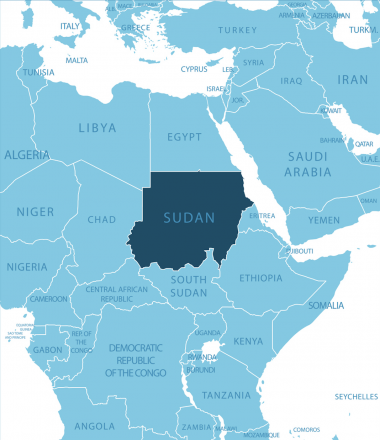Sudan's Christians fear the world has abandoned them

With the world's focus on ongoing wars in Europe and the Middle East, the victims of a conflict in Africa fear that they are at risk of being forgotten and are calling on the West to remember their plight.
Sudan, one of the largest countries in sub-Saharan Africa, descended into civil war just over a year ago, with fighting between the Sudan Armed Forces and the Rapid Support Forces putting millions at risk of displacement and death.
"The situation is deteriorating every day and there is no response from the world. There is a strong feeling of abandonment," Illia Djadi, Open Doors' Senior Analyst for Freedom of Religion or Belief in Sub-Saharan Africa, said.
"Sudan is home to the world's largest mass displacement with nearly 9 million people on the run, and is facing the world's largest hunger crisis, but it is not getting the attention and the response it should compared to other crises."
Illia visited the war-torn region earlier this month, and said that there is a real fear amongst Sudan's Christian community that the world's eyes are turned elsewhere. Bishop Anthony Poggo, the Secretary General of the Anglican, echoed these fears, using a statement to the Anglican Communion News Service to call on the international community "not to abandon the people of Sudan, despite the focus on conflicts elsewhere".
"While there are many positive grassroots efforts to support, including peacebuilding initiatives by religious and traditional leaders and financial provision flowing from the Sudanese diaspora, we appeal urgently for much greater international humanitarian support to mitigate the enormity of the suffering of the people," he said.
Sudan's two million Christians have particular reason to fear a continuation of the conflict. The majority Muslim country was already ranked number eight on the Open Doors World Watch List, which ranks the nations around the globe where Christians face the worst persecution and discrimination. Observers fear that the ongoing violence may be used as a pretext for greater persecution of believers, making an already fraught existence harder for Christians. Already, more than 150 churches have been damaged or destroyed over the course of the war, whether as a result of collateral damage or through being deliberately targeted.
"There is no security, no protection," said Illia. "Not from the warring parties or from opportunists who will use this situation to further their own agendas. Christians and their churches have been attacked with impunity."
Many displaced persons have sought refuge in other areas in Sudan, but fleeing the areas most affected by the conflict areas brings its own risks, especially for Christians. Many face discrimination due to their faith when they do find shelter, and are often neglected or overlooked during aid distribution.
Rachel Morley, an Open Doors researcher, says that for these internally displaced people (IDPs) the risk remains high.
"While refugees move away from the immediate danger and find refuge in places where they receive a level of (international) protection, IDPs do not have that. They are less protected and still at a higher risk because they remain in a similar environment."
Before the latest conflict, Sudan's Christians had felt a degree of hope that things were improving for the country's believers after the civil-military government, put in place after the ousting of dictator Omar al-Bashir in 2019, abolished some of the laws that regulated religious belief and practice. But, now, church leaders fear the former ruling Islamists might take advantage of the ongoing insecurity to return to power, allowing them to re-impose hardline Islamic 'Sharia' laws such as the blasphemy law.
"The international community must act and see an end to this war. There is a real danger of Sudan becoming another Libya where the fall of Colonel Muammar Gadaffi in 2011 left a power vacuum," Illia said.
"This has had great consequences for the region, including trafficking of arms and drugs, and has fueled conflict in other parts of the continent; particularly in the Sahel where it has caused a dramatic humanitarian disaster."











